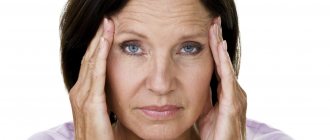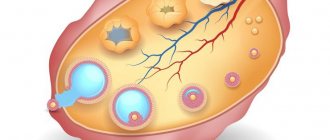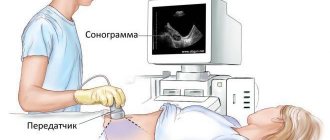Reasons for missing periods at 15 years old
There are certain reasons that indicate that puberty is observed, delay. Therefore, this is why menarche does not occur. Let's discuss the reasons in more detail so that you can understand more clearly why menstruation may be absent.
- Inflammatory processes of the genitourinary organs. Menstruation will be absent with such pathological processes as: Cystitis, Endometriosis. It is extremely important to identify the disease at an early stage, because advanced conditions can be fraught with consequences such as infertility. If you suspect any pathological disease, consult a doctor immediately.
- Problems with hormonal levels. It happens that a girl who has reached puberty does not have enlarged mammary glands, and also has more hair than she should have. These signs indicate a deficiency of the hormone estrogen and an excess of the male hormone.
- Pathologies of the thyroid gland. It is not uncommon for the absence of menstruation to be due to some endocrine problems. It is necessary to show the girl to an endocrinologist and if any disease is confirmed, therapy to eliminate it must be started immediately.
- Having bad habits. Some young ladies can drink alcoholic beverages and smoke already at that age, or even earlier. This may also affect the physiological process.
- Sexual relations. Early sexual relations negatively affect the formation of a girl’s reproductive functions during puberty.
- Excessive physical activity. A fairly common problem among modern girls. Studying at school, various visits to sports sections. Additional classes.
- Systematic stressful situations. If a girl is exposed to frequent stress, these may be problems in the family or conflicts at school, this also affects puberty.
In general, as we already understood, there are quite a lot of reasons. And in order to identify the exact cause, you need to consult a gynecologist. You may need to undergo additional examination and consultation with other specialists such as an endocrinologist. One way or another, do not rush to panic. Just visit a gynecologist.
Symptoms of missed period
A delay in menstruation in some girls affects the psycho-emotional side of the personality. The daughter gets irritated over trifles, takes her anger out on innocent people around her, or becomes lethargic and apathetic.
If the years go by and there is still no menarche, you need to pay attention to the girl’s external image. If the figure does not change according to the female type, parents should show the child to a gynecologist and endocrinologist.
If girls' second periods come with a delay of 20 to 45 days, there is no need to worry. Such cyclicity is not considered anomalous. But when there is no bleeding for several months or six months, or its duration fluctuates sharply (in one month there are 9 days, and in another - 3), you need to urgently contact a pediatric gynecologist.
Doctors identify the complete absence of menstruation in a teenage girl, which is accompanied by a lack of puberty, with primary amenorrhea. If at the age of 14 a girl does not have pubic and armpit hair, the mammary glands do not grow and menstrual bleeding does not appear, the doctor will diagnose “amenorrhea”. For a 16-year-old girl with a full set of signs of puberty, the gynecologist will make the same diagnosis if she has never had her period yet.
In general, no norms for the duration and regularity of the cycle have been established for adolescence. A simple calculation will help mothers track the regularity of bleeding. Having allocated a pocket calendar for menstruation, you need to keep it together with your daughter and mark the arrival of critical days. This is recommended for the first 2 years after menarche.
When does the menstrual cycle begin?
On average, the cycle is established within 2 years. At this time, it is important to monitor all changes and prevent the fact that there are no periods for several months, and the girl does not receive medical care. Such a problem must be discussed with a gynecologist.
In order for the menstrual cycle to be regulated as quickly as possible, the girl needs to create certain conditions:
- Adjust your diet in favor of fortified foods.
- Reduce physical activity and, if possible, intellectual activity.
- Protect your child from stressful situations.
- Organize family walks in the fresh air.
- Rearrange your daily routine so that sufficient time is allocated for night rest.
Some girls during puberty will benefit from consultations with a psychologist. Not every child normally perceives changes in his own body. Sometimes the mental state suffers and emotions go off scale. The task of the doctor and parents is to teach the child to perceive himself correctly.
What to do if a girl aged 12–16 years is late in her period
The reasons for delayed menstruation in girls 11, 13, 15 and 17 years old discussed in the article in most cases are not accompanied by pain symptoms. But if a young lady experiences severe pain in the lower abdomen or lumbar region, and still does not have her period, she should talk to her mother and visit a gynecologist.
Self-medication in this case is unacceptable. Perhaps the problem is related to hypothermia of the pelvic organs or the development of an infectious disease in the genitourinary tract. The doctor will sort everything out.
The cause of delayed periods in adolescents may be polycystic ovary syndrome. The disease signals improper functioning of the appendages, adrenal glands and pituitary gland. Because of this, hormone production slows down and the menstrual cycle is disrupted.
If menarche has not occurred, it will not occur under such conditions. Early diagnosis and timely treatment will help a girl avoid infertility in her family life. Subsequently, the patient should regularly visit the gynecologist for preventive purposes. Optimally – once every six months.
What to do in such a situation
Most girls become nervous if they have not yet started menarche at age 15. But before you start to panic, try to reconsider your lifestyle and make adjustments to it as much as possible. Which? Below, more about this:
- Eliminate stress. Try to be nervous, especially over trifles. Minimize situations in which you have previously been exposed to stress.
- Get treatment on time. If you are not menstruating but have abdominal pain, you urgently need medical intervention. Never take any medications on your own. Only a qualified specialist can prescribe them for you after diagnosis.
- Don't overload yourself. If you play sports hard, also study and also visit tutors. Try to reduce your load, especially when it comes to sports. Loads should be moderate.
- Visit your doctor regularly. If you do not have menstruation at the age of 15, and even if there are no complaints, you still need to visit a gynecologist.
- Normalize hormonal levels. With hormonal imbalances, menarche may also be absent. To find out whether this is the case or not, and also to choose the right drug, you need to contact a gynecologist. If there is a problem with hormonal levels, the doctor will select the necessary drug, after you take its course, menstruation should begin.
- Proper nutrition. Many girls at this age have complexes about their figure. And they go on diets, eat haphazardly. Which negatively affects their physiology. At this age, a teenager needs to receive the necessary vitamins and minerals. It is better to eat more vegetables and fruits, and it is better to exclude pizzas and hamburgers from your diet.
One way or another, you need to take care of yourself, visit a doctor, not overwork, be less nervous and eat well. Before you want to fall into a state of panic, analyze your daily routine, perhaps this is the problem. Also give up sex and bad habits, this is also one of the key factors in a girl’s puberty.
How does menopause begin and how long does it last?
Menopause does not strike a woman overnight; it lasts for several years. Stages of menopause development:
- Premenopause – at 45–47 years of age, estrogen levels in the body begin to decrease. The first delay of the menstrual cycle occurs, the psychological state is unstable.
- Menopause . A year has passed since the last menstruation.
- Perimenopause . A woman feels this stage especially acutely. The signs of menopause are so pronounced that it is quite difficult to cope with them. The duration of perimenopause is from 4 to 10 years.
- Postmenopause . The body has learned to cope with hormonal fluctuations. The symptoms of menopause fade away, but there is a risk of complications.
Even in the initial stage of menopause, a woman should take the necessary measures to reduce the physical and psychological sensations of this period.
Should you worry about menopause at 48?
Mild to moderate menopause is not a cause for concern. But in some situations it is worth seeking advice from a specialist and undergoing a timely examination.
For severe symptoms of menopause, hormone therapy, vitamins and other medications are prescribed to maintain immunity.
Remember that it is not menopause itself that is treated, but the consequences of decreased hormone levels. Having noticed the first signs, it is not recommended to start therapy on your own. The doctor himself individually selects the treatment regimen and dosage, based on the patient’s tests.
Signs of menopause
What the first symptom of approaching menopause will be depends on the individual characteristics of the body. But doctors determine the main classic signs of menopause:
- Tides. Sudden onset of a feeling of heat, redness of the skin of the face and neck. Their duration does not exceed 1 minute, frequency – up to 50 times a day. Hot flashes also occur at night, the woman does not get enough sleep and feels constant fatigue.
- Insomnia. The first sign leads to the second. Hot flashes do not allow a woman to sleep peacefully; even with severe fatigue, a woman can remain awake until the morning.
- Headache. Due to constant tension and prolonged anxiety, a woman drives herself into an unstable psychological state. Frequent migraines appear, the headache spreads to the temples and frontal area. In severe condition, darkening of the eyes is possible.
- Change of emotions. A cheerful mood abruptly and without reason gives way to tears and irritability. At the same time, the woman becomes forgetful and absent-minded.
- Vaginal changes. A decrease in hormone levels leads to laxity of the vaginal mucous membranes. The natural fairy tale of the genital organs is not enough, which is why burning and itching appears. Discomfort may also accompany pain after sexual intercourse or physical activity.
- Urinary incontinence. An insufficient amount of hormones affects the entire genitourinary system of a woman. Gradually, the tone of the bladder decreases, even with laughter or coughing, possibly involuntary passage of a small amount of urine.
- Sweating. Immediately after the hot flash, the woman is covered in sticky sweat, so much of it that she needs to take a shower and change the bed linen.
All these signs of menopause can be separated over time or attack a woman almost immediately. This is purely individual.
Cycle disorders in women 48 years old
One of the main symptoms of menopause in women over 48 years old is irregular menstrual cycles. It is characterized by different amounts of discharge and different periods of time between them. This leads to the loss of a woman's reproductive function.
Sometimes, before menopause, heavy bleeding occurs due to imbalance of hormones, or the discharge decreases and then disappears altogether. It is important not to confuse them with uterine bleeding.
The delay in menstruation during menopause ranges from 3 weeks to 3 months. If they are absent for more than 3 months, this indicates the onset of menopause.











